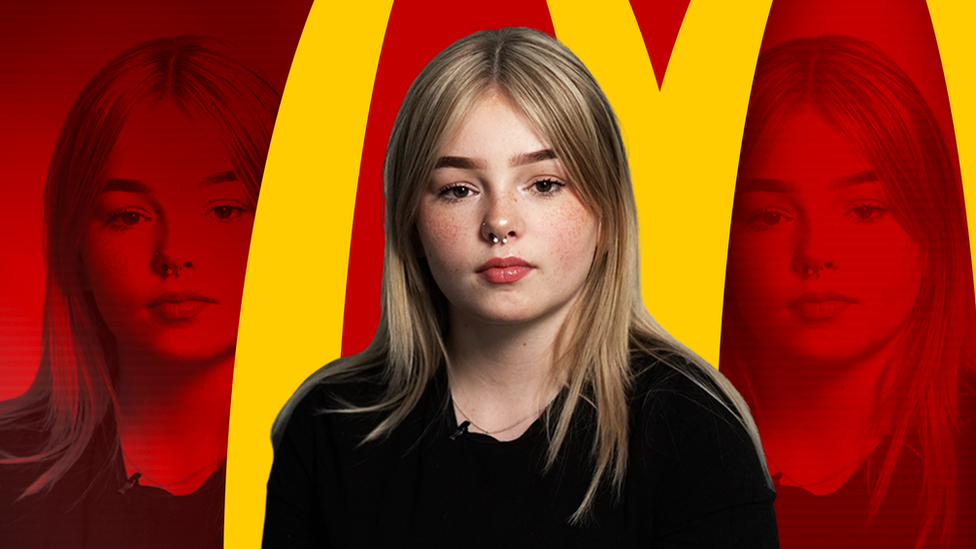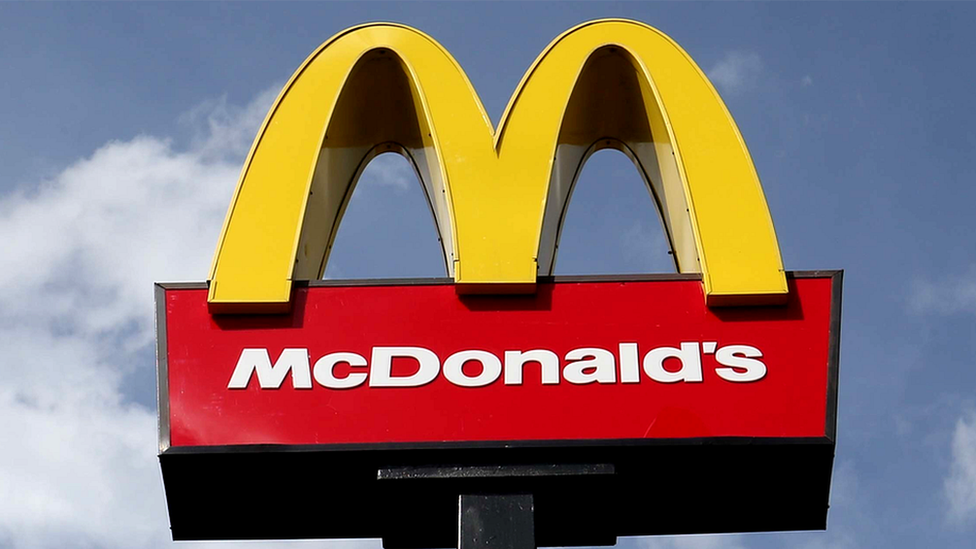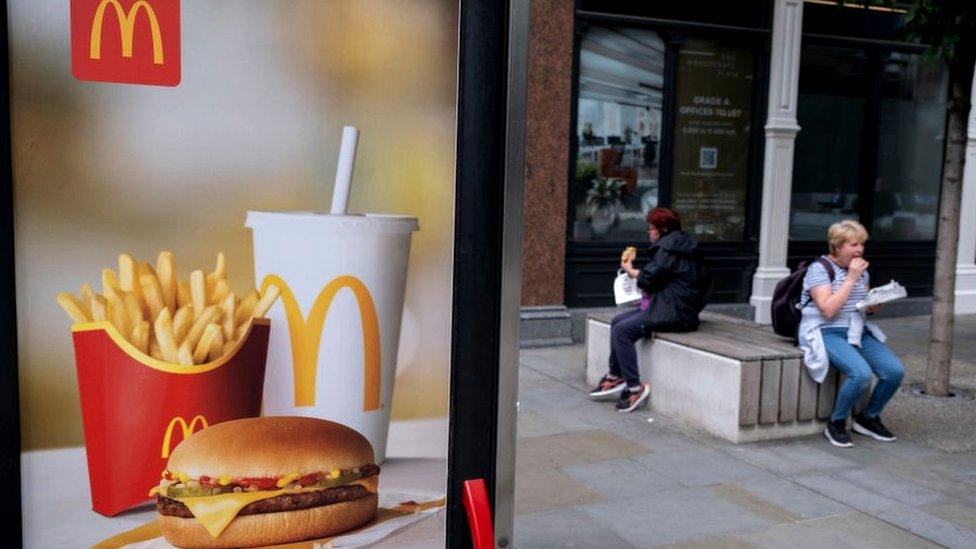McDonald's: 'There's disgusting behaviour at my branch'
- Published

Izzy, who is 18 and works at McDonald's, says she is still witnessing "disgusting behaviour", months after the BBC revealed sexual abuse claims at the fast food chain.
She is one of more than 160 people who have approached the BBC with allegations after our investigation.
They include claims of sexual assault, harassment, racism and bullying.
McDonald's said it was "determined" to root out behaviour that falls below the high standards it expects of staff.
It comes as a group of ex-McDonald's workers told the BBC they planned to take legal action against the firm, accusing it of failing to protect them.
MPs will now question the UK boss of McDonald's over the claims of sexual abuse uncovered by the BBC.
Alistair Macrow will be quizzed by the Business and Trade Committee on 14 November.
Warning - this article contains distressing content
The BBC spoke to more than 100 current and recent McDonald's workers across the UK over a five-month period. The workers - some as young as 17 - said they were being groped and harassed almost routinely.
Since we published our investigation in July, another 160 people have approached the BBC with stories of abuse.
The UK equality watchdog said some 200 people had contacted its email hotline, which it set up in the wake of the BBC's story.
It said it was "concerned" by the latest allegations of harassment and that it was considering "a number of options" on how to proceed with its existing legal agreement with McDonald's.
McDonald's is one of the UK's largest private-sector employers with more than 170,000 people working in 1,450 restaurants.
It also has one of the UK's youngest workforces, with three quarters of staff aged 16 to 25. For many, it is their first job.
Most workers are not directly employed by the company as McDonald's uses a franchise system, which means individual operators are licensed to run the outlets and employ the staff.
However, the corporation does exercise some control over franchisees. The company requires them to ensure "uniformity and commitment" to the McDonald's brand, so that customers can expect the same experience in every restaurant.
To achieve this uniformity, corporate headquarters imposes strict rules on how these companies operate. There are inspections to make sure that each store is complying.
'Nothing has changed'
Izzy told the BBC that male staff openly talked about their sex lives in front of 16-year-old crew members.
"It's not just the language," she said. "It's just, it's unacceptable."
She said that since publication of the BBC report none of the senior management had talked to the crew about how they are.
Her sister Liv worked at the same store in the East of England but decided to quit in the summer.
Izzy said: "It's exactly the same. The behaviour is still as she left, exactly the same. It hasn't changed."
Liv told us she had left after experiencing a sexist and bullying culture. She said one of the senior managers was openly racist about a new employee, who was Sikh. She said he made a comment about how "it was her type of people that bomb us".
"Hearing something like that disgusted me, because I don't get how you can just supposed to be almost setting an example for people, but you're openly and freely saying stuff like this," Liv said.
'It's gross'

Ed said a senior manager at McDonald's repeatedly asked him for sex
Following the BBC's investigation, law firm Leigh Day said it had been contacted by McDonald's crew members who instructed it to start legal action on their behalf.
It could be the first ever MeToo group action taken in the UK.
One client, Ed, was just 16 when he started working at a McDonald's branch in the South of England at the start of this year.
He said a senior manager made sexual innuendos and repeatedly asked him for sex.
Ed told the BBC. "It's gross, it's disgusting. And it's horrifying that someone with that much power in the workplace could say something like that to a 16-year old such as myself."
Ed said he told a senior manager about what had been happening, but he said the manager warned him that if he raised it again, he would face "severe consequences" and would not be eligible for promotion.
He said the harassment went on for several months, and it impacted his mental health and college attendance. Eventually, in April, he quit.
'Groped'
Rachel was 17 when she got her first job at a branch of McDonald's in the North West where she said a manager groped her bottom.
Rachel said the environment was "toxic" and that other male colleagues would make inappropriate comments. She said she emailed the company's staff support service to report the manager who had groped her, but said she never received a response. She left in March 2021.
"McDonald's needs to be doing more to tackle the issue," she said.
She said she had joined the group planning legal action "so that people who are thinking of applying to work at McDonald's are aware before they go into the job".
Kiran Daurka, a partner at Leigh Day, said the stories of sexual abuse and harassment at McDonald's were "disturbing".
"It is our view that they have recourse to legal action, and we are investigating those legal claims."
Alistair Macrow, chief executive of McDonald's UK and Ireland said that following the BBC's investigation in July, he "immediately ordered measures to address critical areas".
"I initiated a company-wide programme of independent investigations, auditing of our complaints processes, reviews of our codes of conduct and, in a number of cases, full disciplinary hearings," he said.
"At the same time as introducing these new processes, we appointed external employment experts to independently evaluate and report on the effectiveness of our employment practices, safeguarding and disciplinary procedures. This process is underway, and we plan to implement new steps identified by this review as appropriate.
"While we are confident in the first steps we have taken, I am determined to understand what more we can do, and our efforts will need to be far reaching and constantly evolving," he added.
"I am personally committed to ensuring all cases brought to our attention are investigated quickly and thoroughly. Where our standards have been breached, or where our processes fall short, I will drive change. I know it takes a great deal of personal courage to speak up and it is my top priority to ensure we act swiftly and decisively on what we hear."

What to do if you have been sexually harassed at work
Report it: Charity Victim Support, external says you can report it to your manager, HR representative or trade union who will take action.
Keep a record: Including dates, times and details of what happened, as well as any relevant emails. These could be helpful if you decide to report it.
Get help: Victim Support operates a free and confidential 24/7 helpline and live chat service. Call 0808 16 89 111 or use the live chat at: victimsupport.org.uk/live-chat, external.
Call the police: If sexual harassment escalates into violence, threats or sexual assault, you should report this to the police by calling 101. If you are in danger, call 999.

If you have been affected by any of the issues in this story, information and support is available via the BBC Action Line.
Some of the names in this story have been changed to protect identities.

Have you been affected by issues covered in this story? You can share your experiences by emailing haveyoursay@bbc.co.uk, external.
Please include a contact number if you are willing to speak to a BBC journalist. You can also get in touch in the following ways:
WhatsApp: +44 7756 165803
Tweet: @BBC_HaveYourSay, external
Please read our terms & conditions and privacy policy
If you are reading this page and can't see the form you will need to visit the mobile version of the BBC website to submit your question or comment or you can email us at HaveYourSay@bbc.co.uk, external. Please include your name, age and location with any submission.

Sign up for our morning newsletter and get BBC News in your inbox.

Related topics
- Published18 July 2023

- Published21 July 2023

- Published19 July 2023
